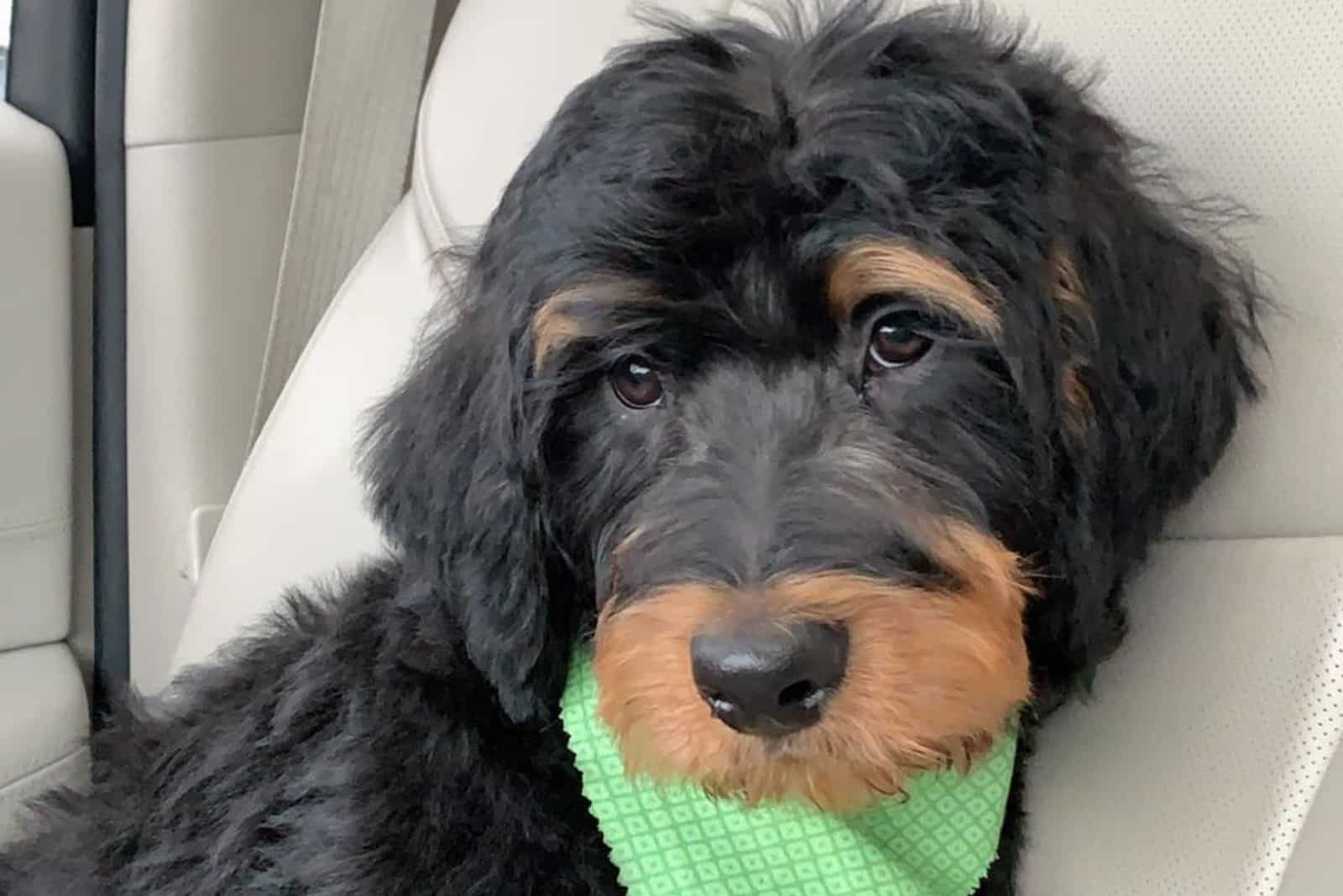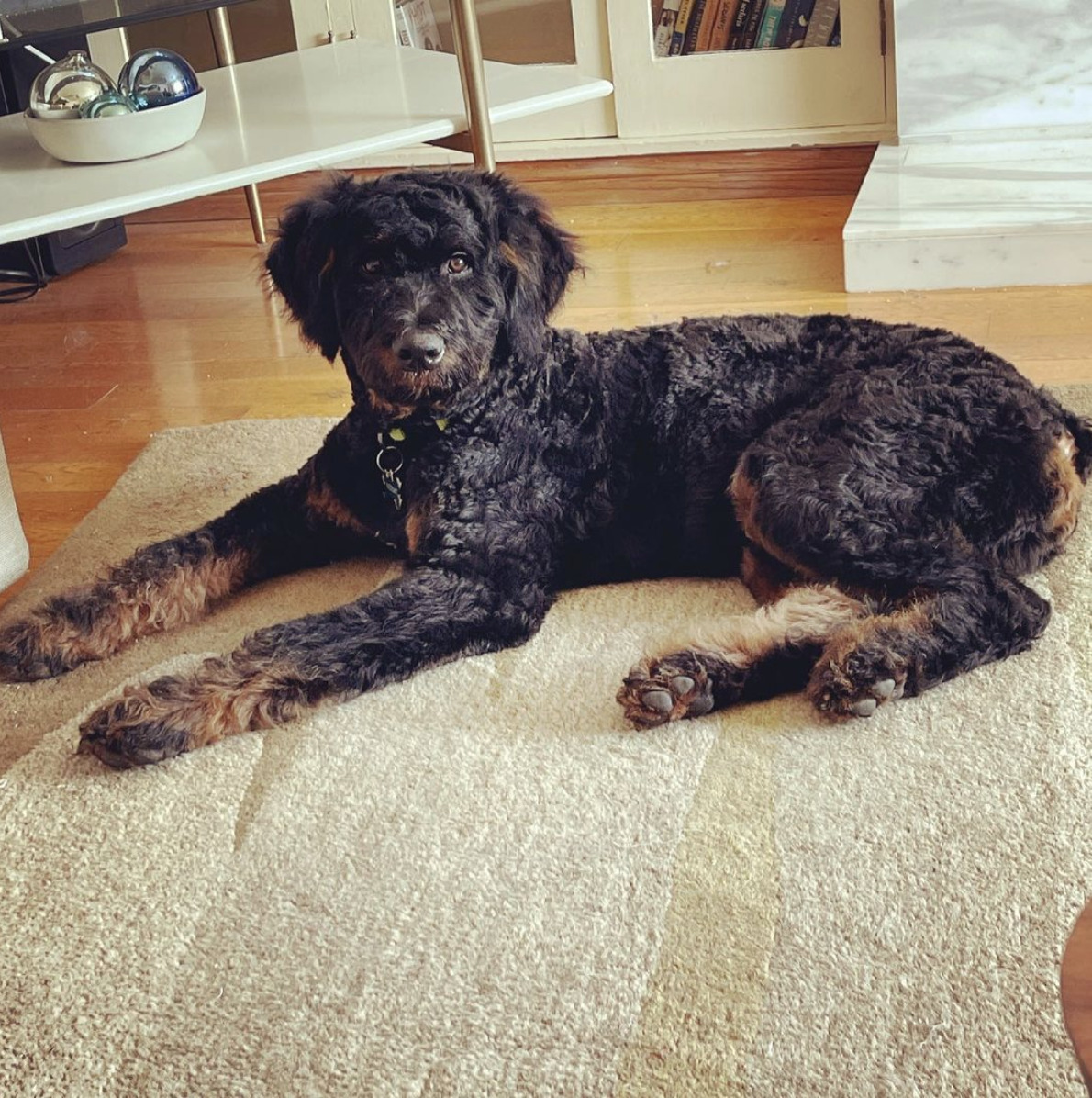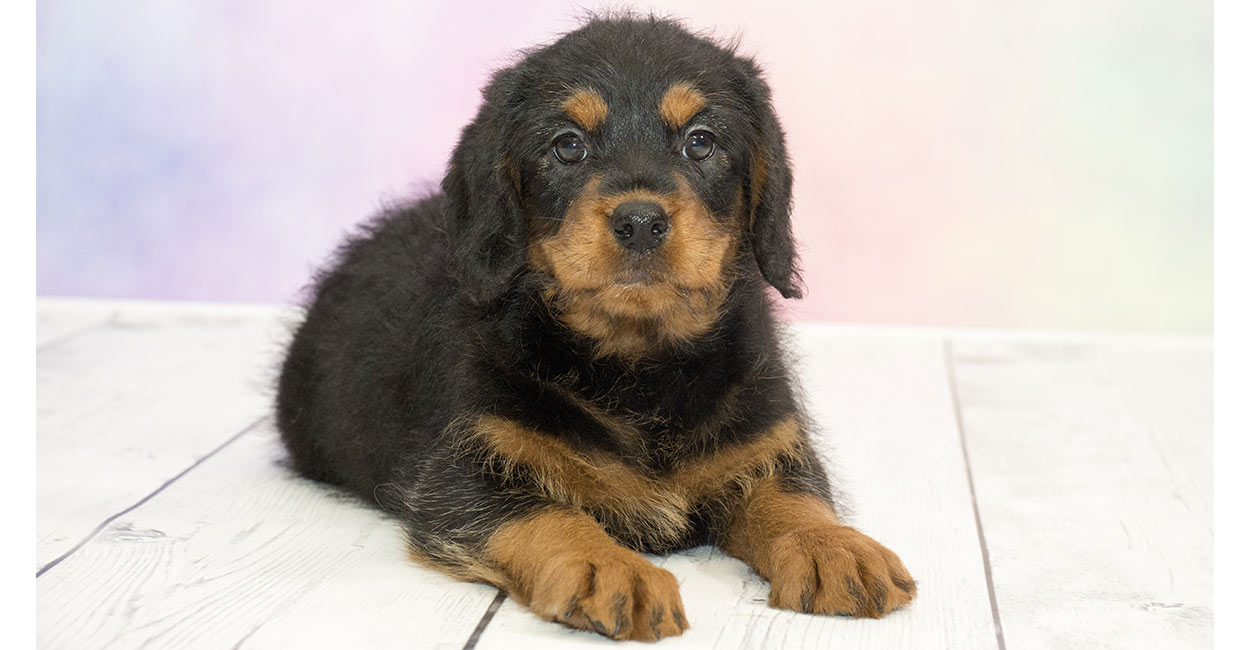Could the perfect canine companion be a blend of brawn and brains, a dog that combines unwavering loyalty with hypoallergenic charm? The Rottweiler Poodle hybrid, affectionately known as the "Rottle," offers just that: a captivating fusion of two distinct breeds that promises a unique and rewarding experience for the discerning dog owner.
This article explores the multifaceted world of the Rottle, from its physical characteristics and temperament to its health needs and training requirements. We'll delve into the specifics of caring for this fascinating hybrid, providing potential owners with the knowledge they need to make an informed decision. Whether you are a seasoned dog owner or a first-time pet parent, the information provided here will help you understand the unique qualities of this remarkable crossbreed and determine if a Rottle is the right fit for your lifestyle. Owning a dog, especially a hybrid, involves significant responsibility, and understanding these aspects is vital for a successful and fulfilling partnership.
- Shameless Cast Salaries How Much Did They Really Make
- Norah Odonnells Net Worth Salary Investments Career Insights
Table of Contents
- Biographical Information
- Characteristics of the Rottweiler Poodle Hybrid
- Appearance
- Temperament
- Health Concerns
- Training Your Rottweiler Poodle Hybrid
- Grooming Requirements
- Diet and Nutrition
- Adopting a Rottweiler Poodle Hybrid
Biographical Information
To understand the Rottle, it's essential to have a clear overview of its origins and key attributes. The following table provides a concise summary of the essential details:
| Attribute | Details |
|---|---|
| Breed Name | Rottweiler Poodle Hybrid (Rottle) |
| Origin | Crossbreed of Rottweiler and Poodle |
| Size | Medium to Large |
| Weight | 50 - 90 lbs (23 - 41 kg) |
| Lifespan | 10 - 15 years |
| Coat Type | Curly or Wavy Fur |
| Temperament | Loyal, Intelligent, Protective |
For further information on the Rottweiler and Poodle parent breeds, you can refer to the American Kennel Club (AKC): American Kennel Club. (Please note: The AKC does not officially recognize mixed breeds.)
- Roseanne Barrs Net Worth How She Built Her Fortune Whats Next
- Unveiling Diane Addonizio The Woman Behind Nfl Legend Howie Long
Characteristics of the Rottweiler Poodle Hybrid
Appearance
The physical appearance of a Rottle is a captivating blend of its Rottweiler and Poodle ancestry. These dogs often possess a sturdy build, inheriting the robust musculature and powerful stature characteristic of the Rottweiler. However, the influence of the Poodle introduces a degree of elegance and versatility in their coat type and overall look. The Rottles appearance is not uniform, with variations occurring depending on the dominant genes inherited.
- Coat: One of the most appealing traits of the Rottle is its coat. It can range from a tight, curly coat, resembling that of a Poodle, to a wavy or slightly coarser texture. This variation is significant for potential owners, particularly allergy sufferers, as the Poodles hypoallergenic qualities can reduce shedding and minimize allergic reactions.
- Color: The color palette of the Rottle is diverse, drawing from the color variations of both parent breeds. Common colors include black, brown, and tan. Markings can vary significantly, with some Rottles displaying the classic Rottweiler markings, while others exhibit a solid color or a mix of shades.
- Eyes: The eyes of a Rottle are expressive and can vary in color, from dark brown to lighter hues. The shape and placement of the eyes contribute to their overall facial expression, often giving them a soulful and intelligent appearance.
Temperament
The temperament of a Rottle is a direct reflection of the traits of both the Rottweiler and the Poodle. Owners can expect a dog that is both loyal and intelligent. The Rottweilers natural protective instincts are often balanced by the Poodle's playful and adaptable nature, making for a well-rounded companion. However, understanding and managing these traits is essential for responsible ownership.
- Loyal: Rottweilers are renowned for their unwavering loyalty, and this trait is strongly present in the Rottle. They often form deep bonds with their families and are devoted companions.
- Intelligent: Thanks to the Poodles exceptional intelligence, Rottles are quick learners and highly trainable. This makes them well-suited for various activities, including obedience training and agility.
- Protective: Rottweilers are naturally protective of their families and property. This protective instinct is often passed down to the Rottle, making them excellent watchdogs. Early socialization is crucial to ensure this protectiveness doesn't manifest as aggression.
- Energetic: Both Rottweilers and Poodles are active breeds. The Rottle requires regular exercise to maintain its physical and mental well-being. Daily walks, playtime, and other activities are essential for their happiness and health.
Health Concerns
As with all hybrid breeds, the Rottle is susceptible to certain health issues that are common in its parent breeds. Responsible breeding practices, including health screenings, can significantly reduce the risk of these conditions. Potential owners should be aware of these potential concerns and prepared to take preventative measures.
- Dysplasia: Hip and elbow dysplasia are common skeletal conditions that can affect both Rottweilers and Poodles. Regular veterinary check-ups and, if necessary, orthopedic interventions are essential.
- Progressive Retinal Atrophy (PRA): This genetic condition can lead to progressive vision loss. Breeders should have their dogs tested for PRA.
- Skin Issues: Allergies and skin irritations may arise, especially in dogs with the Poodle's coat type. Proper grooming, a balanced diet, and allergy testing (if needed) are important.
- Bloat (Gastric Dilatation-Volvulus): Large, deep-chested breeds like Rottweilers are prone to bloat. Owners should be aware of the signs and symptoms and take preventative measures such as feeding multiple small meals per day.
Regular veterinary check-ups are essential for early detection and management of these and other potential health problems.
Training Your Rottweiler Poodle Hybrid
Training is a cornerstone of responsible Rottle ownership. Given their intelligence and eagerness to please, Rottles are generally responsive to training. However, the Rottweiler's strong-willed nature, coupled with the Poodle's sensitivity, requires a balanced and consistent approach.
- Start Early: Begin training and socialization as early as possible, ideally as a puppy. This helps establish good behavior and prevents behavioral issues later in life.
- Positive Reinforcement: Use positive reinforcement methods, such as treats, praise, and toys, to reward desired behaviors. This creates a positive learning environment and fosters a strong bond with your dog.
- Consistency: Consistency is key. Establish clear rules and boundaries, and ensure that all family members adhere to them. This prevents confusion and reinforces your dogs understanding of what is expected.
- Socialization: Expose your Rottle to a variety of people, places, and situations from a young age. This helps them develop into well-adjusted and confident dogs.
- Professional Guidance: Consider enlisting the help of a professional dog trainer, especially if you are a first-time owner or if you encounter behavioral challenges.
With consistent training and socialization, Rottles can excel in obedience and various other canine activities.
Grooming Requirements
The grooming needs of a Rottle will depend largely on the coat type they inherit. Whether the coat is curly, wavy, or a mix of both, regular grooming is necessary to maintain its health and appearance.
- Regular Brushing: Brush your Rottle at least several times a week, particularly if they have a curlier coat. This prevents matting, removes loose hair, and promotes healthy skin and coat.
- Bathing: Bathe your Rottle every few months, or as needed, to keep their coat clean. Be sure to use a dog-specific shampoo.
- Trimming: Regular visits to a professional groomer may be necessary to maintain the coat length and style, especially for dogs with Poodle-like coats. Groomers can also provide nail trimming, ear cleaning, and other essential grooming services.
- Ear Care: Regularly check and clean your dogs ears to prevent infections.
Diet and Nutrition
A well-balanced diet is crucial for the overall health and well-being of your Rottweiler Poodle hybrid. The right nutrition fuels their energy, supports their growth, and helps prevent health issues.
- High-Quality Dog Food: Choose a high-quality dog food that lists a named meat source as the first ingredient. Avoid foods with excessive fillers, artificial colors, and preservatives.
- Age-Appropriate Diet: Puppies, adults, and senior dogs have different nutritional needs. Puppies require a diet formulated for growth, while senior dogs may need a diet lower in calories to manage their weight.
- Regular Feeding Schedule: Maintain a consistent feeding schedule to regulate their metabolism and prevent overeating.
- Portion Control: Monitor your dog's weight and adjust the amount of food accordingly. Overfeeding can lead to obesity, which can exacerbate health problems.
- Fresh Water: Always provide fresh, clean water.
Adopting a Rottweiler Poodle Hybrid
Adopting a Rottweiler Poodle hybrid can be a deeply rewarding experience. However, it is essential to approach the process with careful consideration. Here are some important steps to take:
- Research Reputable Breeders: If you choose to obtain a Rottle from a breeder, research their practices thoroughly. Look for breeders who prioritize health testing, breed responsibly, and provide a healthy environment for their dogs.
- Consider Rescue Options: Explore local animal shelters and breed-specific rescue organizations. Many Rottles, and Rottle mixes, are available for adoption, offering a second chance at a loving home.
- Meet the Dog: Spend time with the dog you are considering adopting. This allows you to assess their temperament and ensure they are compatible with your family and lifestyle.
- Prepare Your Home: Ensure your home is ready for a dog. This includes providing a safe and comfortable living space, dog-proofing your home, and purchasing essential supplies such as food and water bowls, a bed, toys, and a leash.
- Maheep Kapoors Age A Look At Her Life Career
- Malcolm Jamal Warners Marriage Inside His Love Story Life


